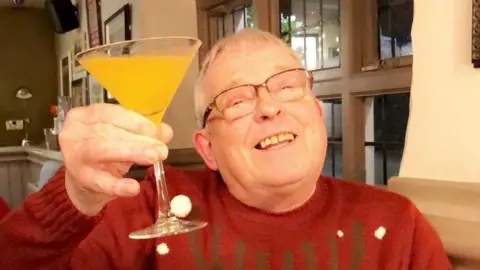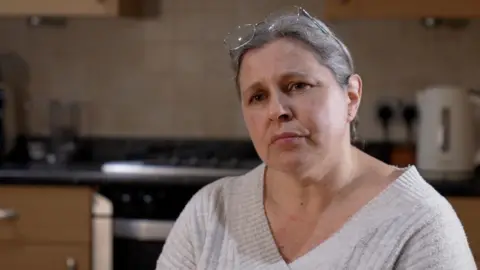Husband died 'in a state' after ambulance no-show
 Family Photo
Family PhotoThe wife of a man who waited more than 14 hours for an ambulance which never showed up has said it was "not fair" he "had to die in that state".
Peter Towndrow fell ill on the night of 4 December, but despite his wife Caroline calling an ambulance at 06:00 GMT the next day, he did not get to hospital until his son drove him in at 21:00.
His condition deteriorated in hospital and he died on 7 December after eventually being diagnosed with sepsis.
The Welsh Ambulance Service said poor ambulance response times were a symptom of broader system-wide pressures.
Liam Williams, executive director of quality and nursing, also said the service would be "reaching out" to Mr Towndrow's family.
Mr and Mrs Towndrow, from Cardiff, met 30 years ago, having two children and amassing a number of pets including dogs, cats and even a sparrow.
Mr Towndrow, in his 70s, would spend summers in his beloved Cornwall, fixing and driving old motors with his son.
But his health started to deteriorate over the summer and he was diagnosed with kidney failure, leading to twice weekly dialysis.
On the night of Wednesday 4 December he began suffering pain in his leg so severe it forced him to sleep downstairs.
Mrs Towndrow said: "By three in the morning, he phoned me because he couldn't wake me, he was in agony."
She called NHS Direct and was told there was concern it might be deep-vein thrombosis (DVT).
Because of that concern, Mrs Towndrow was told to get an out-of-hours GP and ring for an ambulance, which she did at 06:00 on Thursday morning.
She was told there could be a wait of four hours.
"If only it was just four hours," she said.
"I certainly rang another one or two times after and was told at one point it would be at least another eight hours, and that wasn't eight hours including the four I was originally told.
"So however many hours I was told I was aware that wouldn't be before one in the morning."

She could not wait any longer.
She called her son, who lives an hour away in Hereford, to take him to University Hospital of Wales in Cardiff.
The out-of-hours GP had called the hospital to explain she thought Mr Towndrow had cellulitis and suspected DVT, also requesting a bed.
But on arrival, Mrs Towndrow said the hospital staff had no record of the GP's call as it had been so long and they were not ready to receive Mr Towndrow as he had not arrived in an ambulance.
"He was sat there in a huge amount of pain, with this leg that was agonising for a couple of hours.
"I don't know how long he sat there for. Too long."
He eventually got a bed in the early hours of Friday morning, and received his biweekly dialysis later in the day, but his condition was deteriorating.
"I remember being so upset at the state of him," she said.
"I was in such a state, the man in the bed opposite came to comfort me and said 'its OK, you know if he's just had surgery it can take a while to come around', and I said 'he hasn't had surgery'.
"I went to find a nurse and I said 'I think he's dying'.
"She found a doctor, and mentioned almost in passing really that it wasn't cellulitis but it was sepsis.
"That was the first I knew of it, and then from there it just snowballed.
"The last conversation I had with him was when he was just in agony."
Mr Towndrow died in the early hours of the Saturday morning.
Although his health suffered in recent times, Mrs Towndrow said the hours of waiting was not the way it was meant to end.
Mr Williams, of the Welsh Ambulance Service, said: "I would like to extend my sincere condolences to the family of Mr Towndrow on their sad loss."
He added: "Poor ambulance response times are a symptom of a much broader system-wide pressures including hospital handover delays."
Cardiff and Vale University Health Board said it was unable to comment on individual patient care, but said: "Our thoughts are with the family of Mr Towndrow at this difficult time."
